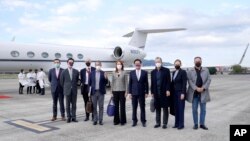A delegation of former U.S. defense officials is in Taiwan to meet with senior leaders and signal support for the self-governing island, as Russia's invasion of Ukraine highlights threats to democracies around the world.
The group includes former U.S. Chairman of the Joint Chiefs of Staff Admiral Michael Mullen; former Deputy National Security Advisor for Iraq and Afghanistan Meghan O'Sullivan; former Under Secretary of Defense for Policy Michèle Flournoy; and former National Security Council senior directors for Asia Mike Green and Evan Medeiros. The group collectively served under former U.S. Presidents Bill Clinton, George W. Bush, and Barack Obama.
“The selection of these five individuals sends an important signal about the bipartisan U.S. commitment to Taiwan and its democracy and demonstrates that the Biden administration’s and the United States’ commitment to Taiwan remains rock solid,” a senior Biden administration official in Washington told VOA on background.
The trip coincides with a separate visit by former Secretary of State Michael Pompeo, who will arrive in Taiwan on Wednesday to speak at the government-affiliated Prospect Foundation. He will also meet with Vice President Lai Ching-te and Foreign Minister Joseph Wu.
Michael Mazza, a non-resident fellow at the American Enterprise Institute, speculated that Mullen may have come with a message for Taiwan’s senior leadership and would return with a response for White House officials.
While Mullen is a former official, someone of his stature carries more diplomatic weight than a normal diplomatic message, Mazza said.
“The selection of Admiral Mullen to lead this delegation may serve multiple purposes. He is, first, well-poised to deliver important messages regarding defense and, second and related, to assess any defense-related issues or concerns that Taiwan’s leaders may raise,” Mazza told VOA by email.
“There is significant concern in Washington right now that the Overall Defense Concept has been abandoned, or at least downgraded, in Taiwan’s defense strategy. It is likewise unclear what, if anything, has replaced the ODC. I’d be surprised if Mullen did not raise these concerns and seek out details about the direction Taiwan’s defense strategy is taking,” he said.
Under President Tsai Ing-wen, Taiwan has focused on an “asymmetric defense” strategy to make it an unattractive target to China’s Communist Party, which claims Taiwan as a wayward province and has not ruled out an invasion.
This strategy has focused on making it clear to Beijing that the cost of invading Taiwan would be extremely high even though it has superior military power.
While this policy has been advocated by Tsai, there is ongoing concern in Washington that these policies are not being fully carried out by Taiwan’s Ministry of National Defense, an institution that typically skews conservative in its policymaking.
Wen-ti Sung, a cross-strait relations expert at the Australian Centre on China in the World at the Australian National University, said that rather than abandoning its Overall Defense Concept, Taiwan is in the midst of discussing how to rebalance and “future-proof Taiwan’s capacity.”
Sung said analysts in Taiwan have questioned whether the island’s current defense strategy is too focused on deterring an amphibious landing by China’s People’s Liberation Army.
Weapons purchases and training have reflected that strategy, he said, but they may not be of much use after 2035 when the PLA completes its modernization campaign.
“They need to spread eggs in more baskets and shift away from single threat-based planning and move towards a more balanced capability-based approach to force building,” Sung said by phone.
“I think discussion and some [white] papers are discussing that kind of rebalancing,” he said. “I don’t think Taiwan is ditching the ODC, but there are new thoughts being given to ODC and more traditional deterrence.”
Last week, Taiwan’s foreign minister told the McCain Institute for International Leadership that the democracy needs continued U.S. support to defend itself from China, which experts say could have the ability to attack Taiwan as early as 2027.
In the meantime, China has scaled up pressure on Taiwan in other ways. In 2021, China sent more than 1,000 flights into Taiwan’s air defense identification zone, a swathe of land and sea around the Taiwan Strait monitored by Taiwan’s military, to send the message that the democracy is “doomed,” according to Wu.
While Taiwan and the United States do not have formal diplomatic relations, the U.S. is the island’s most important ally and has committed to providing Taipei with the means to defend itself under the 1979 Taiwan Relations Act and other follow-up agreements. These have included major weapons sales, which escalated during the administration of former U.S. President Donald Trump and have continued under current President Joe Biden.
Last August, the Biden administration approved $750 million in weapons sales to Taiwan.
Former and sitting U.S. officials regularly visit Taiwan although the opposite is rare. Visitors last year included former U.S. Senator Chris Dodd and former Deputy Secretaries of State Richard Armitage and James Steinberg, while Alex Azar, then-secretary of the U.S. Department of Health and Human Services, also visited Taiwan in 2020.







